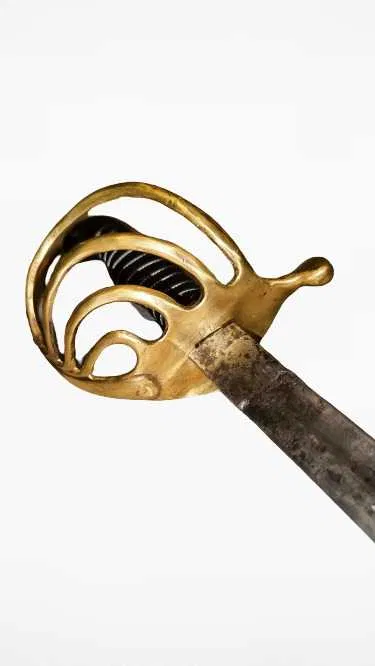Antique Small Saber from XIX Century Antique
Ships from
Poland

Don't miss out on this item!
There is only 1 left in stock.
No feedback (Verified phone number)
Shipping options
Seller handling time is 28 business days Details
This reflects the seller's handling time and may not include time spent in transit.
If you have questions about shipping, please contact the seller.
£37.79 to United Kingdom
Ships from
Poland

Offer policy
OBO - Seller accepts offers on this item.
Details
You can make your offer during the checkout process as long as you do not live in a state where marketplace facilitator tax laws exist.
Check your state.
Payment options
PayPal accepted
PayPal Credit accepted
Venmo accepted
PayPal, MasterCard, Visa, Discover, and American Express accepted
Maestro accepted
Amazon Pay accepted
Nuvei accepted
No feedback (Verified phone number)
Shipping options
Seller handling time is 28 business days Details
This reflects the seller's handling time and may not include time spent in transit.
If you have questions about shipping, please contact the seller.
£37.79 to United Kingdom
Ships from
Poland

Offer policy
OBO - Seller accepts offers on this item.
Details
You can make your offer during the checkout process as long as you do not live in a state where marketplace facilitator tax laws exist.
Check your state.
Payment options
PayPal accepted
PayPal Credit accepted
Venmo accepted
PayPal, MasterCard, Visa, Discover, and American Express accepted
Maestro accepted
Amazon Pay accepted
Nuvei accepted
Item traits
| Category: |
Other
|
| Quantity Available: |
Only one in stock, order soon
|
| Condition: |
Used
|
| Material: |
Steel
|
| Handmade: |
Yes
|
Listing details
|
Seller policies:
|
View seller policies
|
|
Shipping discount:
|
No combined shipping offered
|
|
Posted for sale:
|
More than a week ago
|
|
Item number:
|
1617989065
|
Antique Small Saber from XIX Century
The history of antique kid-sized sabers from the 19th century offers a unique perspective on the cultural, social, and educational practices of the era. These miniature sabers were not only objects of play but also served educational and symbolic purposes, reflecting the values and aspirations of children and society at large during the 1800s.
81CM
Early 19th Century:
Napoleonic Wars:
The early 19th century saw the height of the Napoleonic Wars (1803-1815), where sabers played a significant role in cavalry charges and close combat.
French cavalry, under Napoleon Bonaparte's leadership, relied heavily on sabers, using them effectively in battles such as Austerlitz, Borodino, and Waterloo.
Design and Construction:
Small sabers of this era typically had curved blades designed for slashing and thrusting motions.
They were often ornately decorated, reflecting the status and rank of the officer wielding them.
The hilts were usually crafted from brass, sometimes adorned with intricate designs or regimental symbols.
Mid-19th Century:
Industrial Revolution:
The mid-19th century saw significant advancements in manufacturing techniques due to the Industrial Revolution.
This led to changes in saber production, with more standardized designs and mass production becoming common.
Crimean War and American Civil War:
Sabers continued to see use in conflicts such as the Crimean War (1853-1856) and the American Civil War (1861-1865).
In the American Civil War, sabers were issued to cavalry units on both sides and were used in many famous engagements, including Gettysburg and Antietam.
Late 19th Century:
Technological Advancements:
By the late 19th century, the advent of rifled firearms and changes in military tactics began to diminish the role of the saber on the battlefield.
However, they remained an important ceremonial and dress weapon for officers.
Transition to Dress Sword:
As the 19th century progressed, the saber's function shifted more towards ceremonial purposes rather than practical combat.
Many small sabers from this period were produced primarily for dress occasions, featuring elaborate designs and often being more ornate than functional.
Legacy:
Collectibility and Cultural Significance:
Antique small sabers from the 19th century hold significant value for collectors and enthusiasts today.
They serve as tangible reminders of a bygone era of military tradition, craftsmanship, and honor.
Museums and private collectors often showcase these sabers as part of their historical collections, preserving their legacy for future generations.
In conclusion, the history of antique small sabers from the 19th century reflects the evolving nature of warfare, technological progress, and changing cultural attitudes towards military equipment. From the battlefields of the Napoleonic Wars to the ceremonial parades of the late 19th century, these sabers played a vital role in military history and continue to captivate enthusiasts with their beauty and historical significance.
81CM
